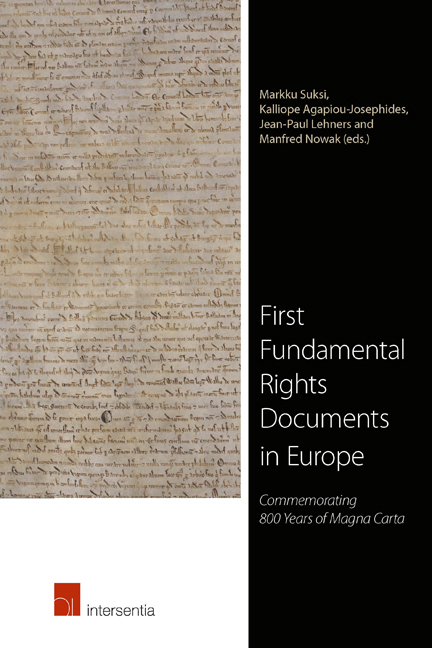Book contents
Preface
Published online by Cambridge University Press: 15 December 2017
Summary
In 2015, we are celebrating the 800th anniversary of Magna Carta, adopted on 15 June 1215, and the 15th anniversary of the Charter of Fundamental Rights of the European Union, adopted on 7 December 2000. Between 1215 and 2000, and perhaps also before and after that period, various jurisdictions in Europe have adopted documents that are of significance for the protection of fundamental rights and, ultimately, after 1945, of internationally recognised human rights. Historians and others like to commemorate ‘round’ birthdays: 25 years, 100 years, 800, etc. An event is not important per se because of a specific birthday, but it may be worthwhile to take the opportunity to contextualise fundamental rights by studying history and thus at the same time recognise the value of Magna Carta and other fundamental rights documents.
With this book we wish to celebrate 800 years of Magna Carta. At the same time, we congratulate the European Union on the first 15 years of its first fundamental rights document. This volume can be seen as a birthday present to the teenager from the rest of the family, all of whom are older, some very old or even ancient.
But why the first fundamental rights document? Do we want to show that some states, regions or cities have been more progressive than others or to imply that there has been no development in some states? Certainly not; this is not a beauty contest. Whenever the first fundamental rights document has been adopted or issued in a jurisdiction, it is likely to have had similar relevance for the individuals living at the material time as a document adopted in some other place at some other point of time, be it earlier or later. Therefore, the topic is fitting for a joint study as part of the cooperation between the universities in the European Master's Programme in Human Rights and Democratisation. Even Magna Carta itself, adopted 800 years ago, is not important per se, but it is significant because of the use that has been made of it during the centuries, alongside its strong symbolic value; the same observation is probably true concerning the other fundamental rights documents reviewed here, albeit in most cases to a somewhat lesser extent.
- Type
- Chapter
- Information
- First Fundamental Rights Documents in EuropeCommemorating 800 Years of Magna Carta, pp. v - viiiPublisher: IntersentiaPrint publication year: 2015

